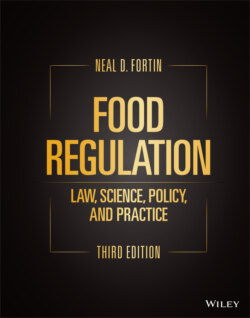Читать книгу Food Regulation - Neal D. Fortin - Страница 34
1.4.7 Constitutional Limitations on Agency Power
ОглавлениеPolice power, specifically the power of state governments to regulate for the health and welfare of the people, has been upheld to be quite broad in reach and impact. Generally, these laws will be upheld if they are at all rational attempts to protect and promote the public’s health, safety, or general welfare. The courts will not review whether the laws are the best option or even whether they are “good” laws, but merely whether they avoid being arbitrary or capricious.
State authority to regulate health, safety, and general welfare has been sustained not only for laws aimed at protecting the public in general but also protecting individuals. Such laws have been upheld even when restricting property rights and individual autonomy. The U.S. Supreme Court made it clear that “the police power is one of the least limitable of governmental powers … .,” and that the states possess extensive authority to protect public health and safety.39
Although the courts have interpreted the state police power broadly, governmental authorities do have limits placed on their powers. Limitations on state and federal powers are mainly found in these documents:
The U.S. Constitution.
The constitutions of individual states.
Federal and state laws.
In the case of a federal law, the federal government has limited, enumerated powers. If the subject matter of legislation does not fall within any of the enumerated areas of federal authority, then either the matter is one that is reserved to the states or it is a matter beyond the constitutional reach of government altogether. For example, Congress passed a law that required states to provide a disposal site for low‐level radioactive waste by a specific date. Any state that failed to meet that deadline was required to take title to and be responsible for all low‐level radioactive waste produced in the state. New York State contested the “take title” provision on the ground that it went beyond the enumerated powers of the federal government. The U.S. Supreme Court agreed that the act violated the Tenth Amendment of the U.S. Constitution.40
Food laws are sometimes challenged as infringing upon constitutionally protected individual rights. The first ten amendments to the Constitution, the Bill of Rights, define those things that government cannot do to the individual. If Congress or a state legislature enacts a law inconsistent with any of these constitutional provisions, the courts may be asked to invalidate the law as being “repugnant to the Constitution.”
In the area of food safety, however, the courts historically have been hesitant to invalidate these laws, even for the sake of protecting individual rights. Nonetheless, food laws have been challenged on this basis, and some important aspects highlighted below foreshadow issues that will rise in subsequent chapters. The cases illustrate how an individual’s rights are balanced against society’s need for protection from preventable harms.
The Bill of Rights is generally applicable to the states through the Fourteenth Amendment. Right by right, the Supreme Court has applied most, but not all, of the Bill of Rights’ restrictions to the state governments through the Fourteenth Amendment. For example, the states may not pass laws that abridge the freedom of speech, press, or assembly. Technically, the state law would be in violation of the Fourteenth Amendment, but for ease of reference, this chapter will refer to the underlying Bill of Rights amendment (in this example, the First Amendment’s protections of the freedom of speech, press, and assembly).
